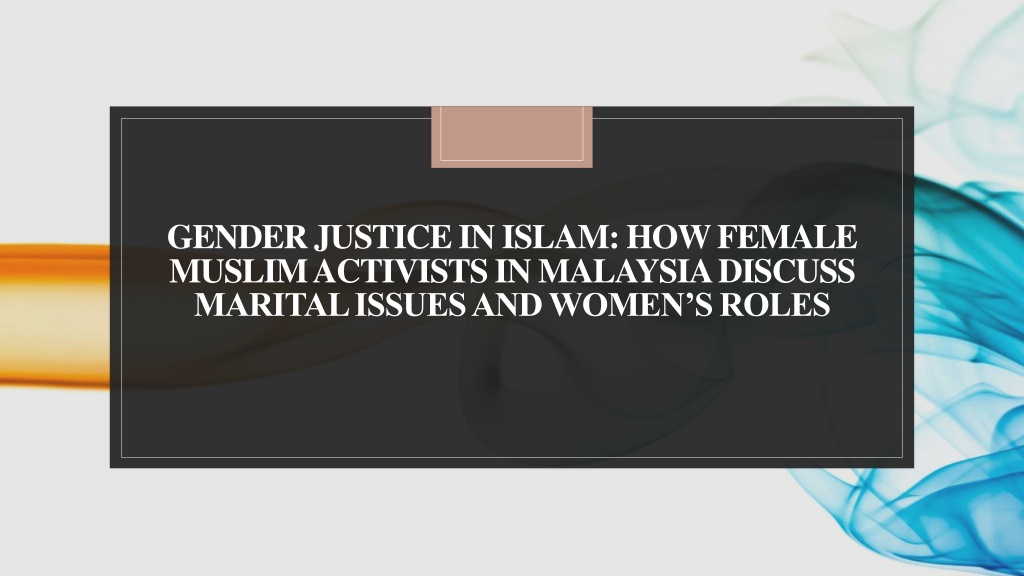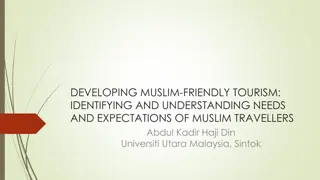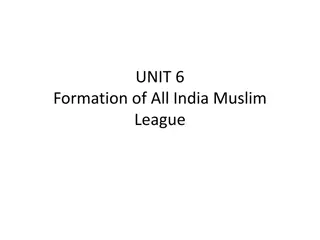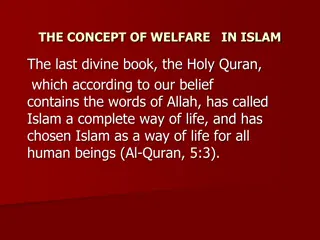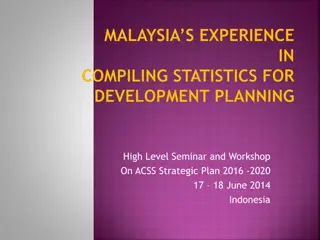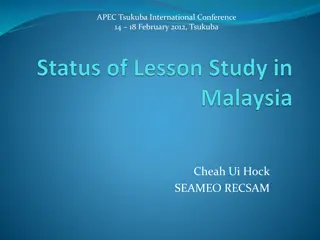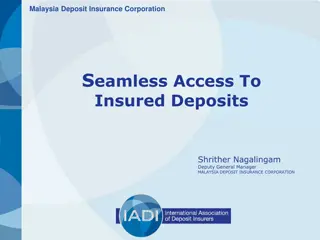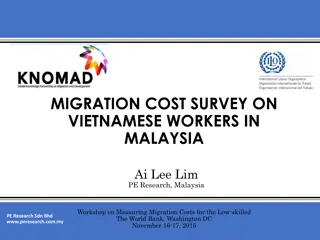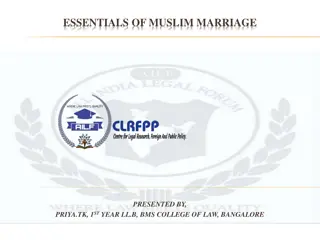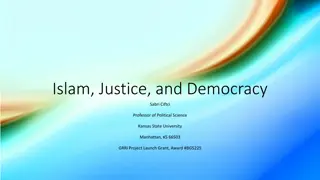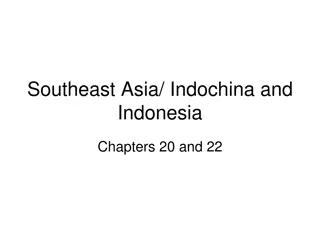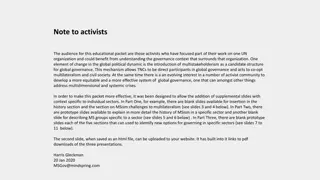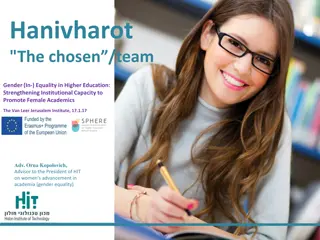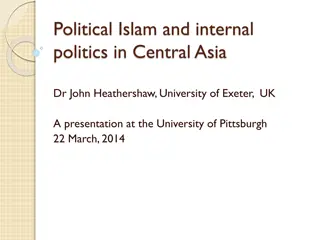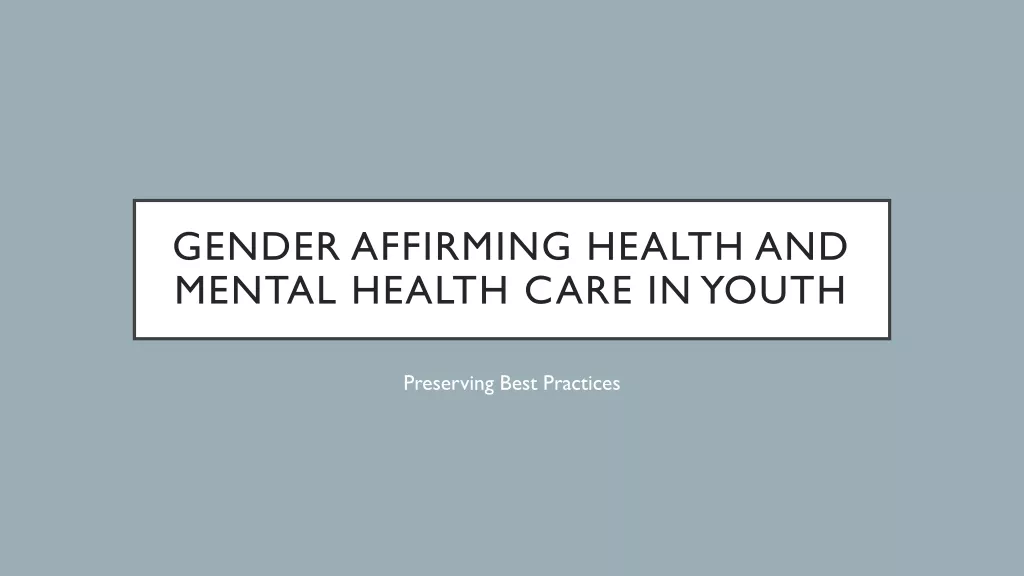Gender Justice in Islam: Perspectives of Female Muslim Activists in Malaysia
Muslim activists in Malaysia examine gender justice concerning marital issues and women's roles, discussing matters like polygamy, child marriage, and women's welfare. While advocating for women's welfare in polygamous marriages, they cite challenges in cases of child marriage and women's roles. These activists explore gender equality and complementarity, navigating Islamic feminism and emphasizing the importance of fairness and accountability in legal frameworks.
Download Presentation

Please find below an Image/Link to download the presentation.
The content on the website is provided AS IS for your information and personal use only. It may not be sold, licensed, or shared on other websites without obtaining consent from the author. Download presentation by click this link. If you encounter any issues during the download, it is possible that the publisher has removed the file from their server.
E N D
Presentation Transcript
GENDER JUSTICE IN ISLAM: HOW FEMALE MUSLIM ACTIVISTS IN MALAYSIA DISCUSS MARITAL ISSUES AND WOMEN S ROLES
Research Questions How do Muslim activists in Malaysia understand gender justice in relation to marital issues and women s roles? Are they more sympathetic to the notion of gender equality or gender complementarity?
Main Argument While the activists generally advocate for the individual welfare of women in polygamy, welfare becomes a more contested notion when discussing child marriage and women s roles.
Islamic Feminism Speaking in feminist language without identifying as feminist. Current works on activism in Malaysia Interviews with 14 Muslimah activists from: Sisters in Islam (SIS), Interactive Muslimah Association (IMAN), The Women s Wing of the Muslim Youth Movement of Malaysia (Helwa ABIM), The International Women s Alliance for Family Institution and Quality Education (WAFIQ), the women s wing of Malaysian Muslim Solidarity (Wanita ISMA), and Wanita IKRAM Ziba Mir Hosseini, Amina Wadud, and Zainah Anwar at the launch of Journeys Toward Gender Equality in Islam. Source: MalayMail.
Legality without fairness 1. Polygamy is not the problem; the administration of justice is 2. Ensuring men are held accountable. A women-centred approach We have our own structure and institution. To say that Islam in Malaysia is not doing justice to others is not correct. The issue of justice, Imad, is access to justice. Lot of women have been denied access. The word court itself is very terrifying. Even when they get access to justice, the legal process is very long (Hanisah, HELWA ABIM). So, when Allah says polygamy is allowed, there surely must be good things behind it. But it should be understood as a whole rather than just good things. For example, what are the responsibilities and requirement for men to enter polygamy? Polygamy is not just men with many wives, but it's actually families because initially we just have maybe one small nucleus family. Now when you enter polygamy, you are broadening into more nucleus families (Amirah, Wanita IKRAM). A polygamous couple in Malaysia. Source: AsiaOne.
What does child mean? 1.Prioritizing the individual well-being of the child 2. Access to education as a child s basic right The government should protect the girls. The negative effect of child marriage is on the girl, not on the boy. Because of pregnancy. Kids should have the opportunity to continue their education. They also have ambition like the boys. (Azizah, HELWA ABIM). I remember I proposed 18 for both. If anything happens to the marriage, at least the girl completed her SPM. If she is just with an SRP, what can she do? She will end up as a menial worker (Atikah, IMAN).
What does child mean? Age as an arbitrary figure Interpretation of young should be context-dependent So, who defines the maturity? That means there has to be an interview, there has to be an observation. So even if she's just 12 years old but she acts very maturely, body size is physically big, you know, then leave it to the court to decide. Don t just say no, because she's a child, no marriage . You have to look at the individual, but I wouldn't encourage it because of that maturity (Maznah, IMAN). We also need to see that there's a possibility because being in the very poverty state that you're in, 16 might be a very mature person as compared to a 16-year-old girl in Kuala Lumpur (one of the most urban cities in Malaysia). There are lots of things to look into. Not just the age itself, but the situation of the family, the maturity of the girl, and so on and so forth. It's not totally black and white in a way. (Radhiah, Wanita IKRAM).
Womens Roles in Islam Equal division of labour No, I don't think so. It happens a lot, among my family members, among my friends where the woman earns more, but there is the understanding between the husband and wife, because they live together not to compete with each other, but they help each other the man or the husband also needs help, because this is a family thing, not an individual thing (Saliha, WAFIQ). I belong to a household where it's all women, and a man. My father was a good Muslim man. He spent every wealth he has to educate all of us. I married a humble man of equal persuasion. You know, his mother was a career woman. So the mother trained the boys to do house chores. For me, I would support this kind of equal sharing thing. All my married life, he (husband) will help. I don't do cooking unless I choose to and I do that quite a bit.. (Mastura, IMAN).
Womens Roles in Islam Remembering the home even when outside the home Women as representative of society It depends on her capacity. Some people can take on more workload than others. If you have the tentacles of an octopus to accomplish everything you need to accomplish, then I do not see a problem. Do I believe that a woman's place, the priority is still at home? Yes. Because we are supposed to shape our society and our cause. For me, personally, the reason why I see too many social issues that are brought into discussion is because of the failures of our mothers to educate as mothers (Zulaikha, WAFIQ). What is happening now is our Muslimah has gone off tangent because of many factors so they are basically materialistic and individualistic. That s the reason the cosmetic industry is thriving like anything. Because the definition of beauty means you have to be fashionable because you want to attract attention. So, when we attract attention, it s more on You , me , I , so, again, individualism. It's not a God-conscious person. It s more on fashion-conscious (Atikah, IMAN).
Implications of Findings Moving beyond binary in modes of thought. Grappling between tradition and modernity.
